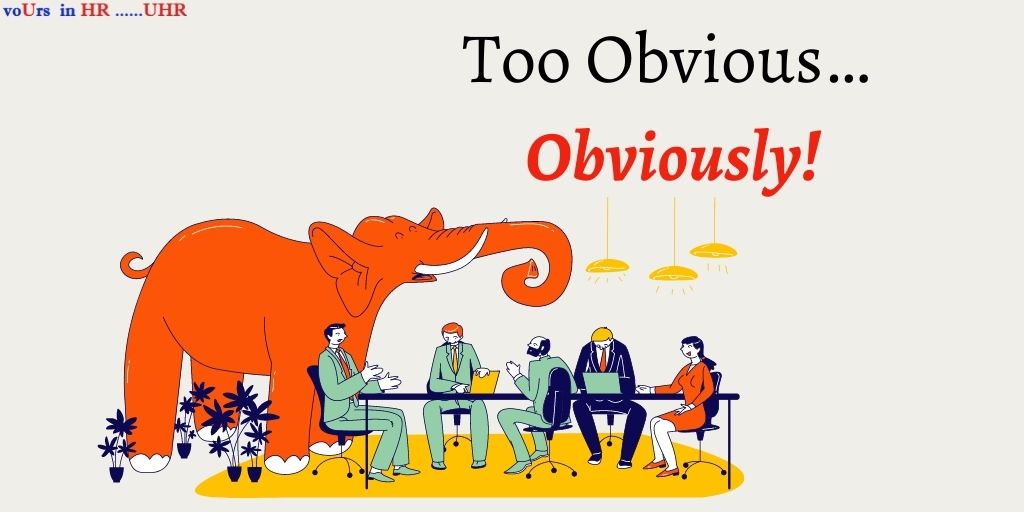
There are articles all over the internet telling us all about out-of-the-box thinking. We are encouraged to brainstorm innovative and ground-breaking solutions; we are encouraged to think differently. We are told to move beyond the obvious and find ways to come up with fresh insights.
But somewhere, we forget about the surprising power of stating the obvious.
Stating what is seemingly obvious. To us.
The Deceptively Simple:
Let us delve further into this. What is it about brainstorming that makes us hold back on our ideas? Often, we underestimate the value of seemingly simple solutions. Additionally, we just assume everyone thinks the same way as we do.
An article by Teresa Colon on Medium tells us about some seemingly obvious solutions which no one voiced. The writer goes on,
‘One good example is the time my company was assembling a customer summit. We had channel partners who wanted to attend (for those unfamiliar, those are essentially resellers) and we were nervous about getting enough customers to sign up. It was critical for the defined success of the summit that it was customer-heavy and -focused.
What’s the obvious answer here?
Obviously, it seemed to me, the partner who has the most customers in attendance gets to go. It incents the partners to encourage their customers to sign up and gives them a stake in the success of the event. It seemed so obvious to me that I didn’t bother even speaking it aloud. I assumed that someone else was already working on that angle.
It wasn’t until thirty minutes into the conversation, when we were still brainstorming ideas for signing up customers, that I verbalized what I thought was obvious.
I got blank stares all around before the “ahas” showed up on their faces. Apparently, what was obvious to me wasn’t obvious to them.’
Or maybe, it was obvious to everyone but no one thought it was an insight valuable enough, innovative enough, ground-breaking enough to be spoken out loud. Everyone might have been wondering about the sheer simplicity of the idea, the sheer obviousness of it. And who wants to hear the obvious, they all must have wondered.
Turns out, that obvious, deceptively simple insight was what pushed the discussion forward.
The Ridiculousness of the Obvious:
As mentioned earlier, in a culture that stresses the need to innovate and break rules all the time, the obvious sounding solutions actually become the need of the hour. Some ideas seem so obvious that no one thinks worth voicing them, and as a result, the one who does voice them becomes an innovator! It is almost a comical situation where one takes a detour because they think the main road would be jampacked, only to realise everyone thought the main road would be jampacked and thus everyone ended up taking the detour, creating a traffic-jam there. The one who took the main road found no traffic.
Moreover, most of us are stressed out, and often overburdened and it might take a nudge for us to see the obvious.
Organisational Psychologist Adam Grant gives us more nuances to think about in an article:
‘A few years ago, the people analytics experts at Google stunned me with one of their recommendations to managers. They had been studying how to onboard new hires effectively. After running surveys and experiments, they came back with a list of tips. Here’s the one that jumped out at me:
Meet your new hires on their first day.
People analytics has transformed HR and talent management into a data-driven field. Since Google was a pioneer in the field, I was expecting an aha moment. Instead, I got a duh-ha moment — a sudden flash of the blindingly obvious.’
Grant goes on to wonder how as an Organisational Psychologist his work has been to present ‘the counterintuitive’, ‘the unexpected’, ‘the overlooked’. But then he goes on to say how,
‘…Google’s analytics team had done the exact opposite of all that: They had confirmed the most banal of my expectations. I felt like I was hearing from Pelé that the key to becoming a great soccer player is wearing shoes. Who needs to be told to meet their new hires on their first day? What kind of manager wouldn’t do that?
A busy one, it turns out.
A manager who is so preoccupied with their work and burdened with so much responsibility that a simple idea like this just doesn’t register or strike. We are a busy species and sometimes, we forget the value of simple actions. It takes a sudden realisation to see how simple and uncomplicated a situation can be.
The sudden realisation of the value in taking the main road when everyone is busy taking the detour.
The value of obvious ideas is thus often overlooked because of the widespread culture of pushing innovation a bit too much. We often underestimate our own ideas and thinking, assuming it might be obvious to everyone, only to realise much later that not everyone thinks the same way as we do. Effortless, obvious, simple solutions are what’s needed amidst a culture that can become monotonous, tiring and one that stretches us in all directions with countless commitments.

